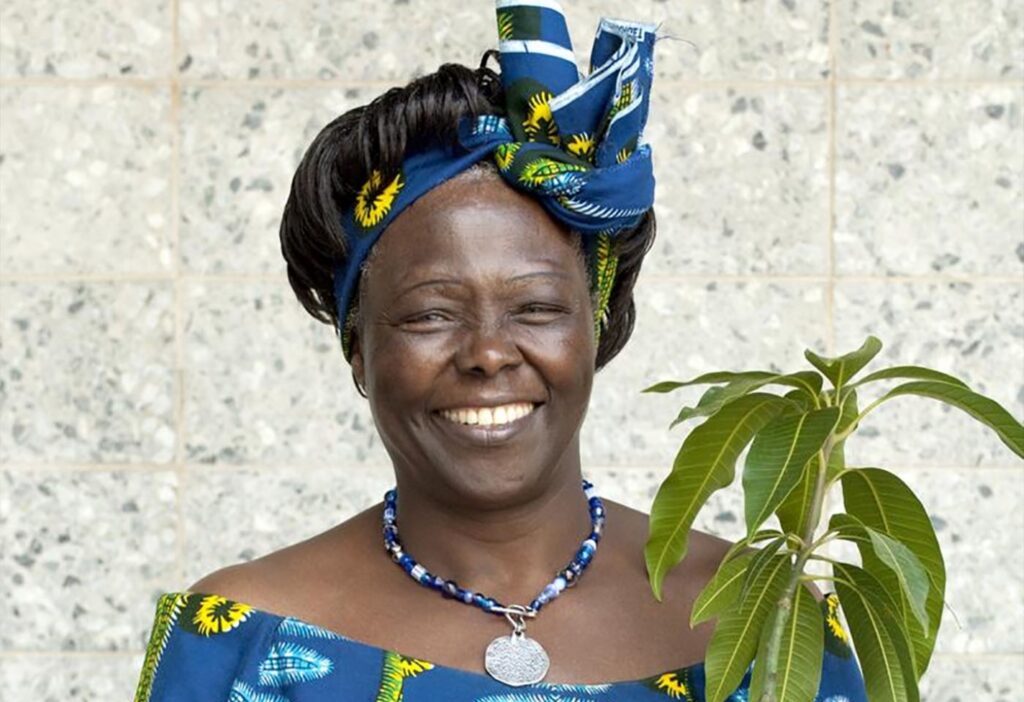
Wangari was born in Nyeri, Kenya in 1940. Growing up, she experienced first hand the effects of deforestation in her home town of Nyeri. As a little girl, Wangari would go on foot to fetch water from a nearby stream to provide fresh drinking water for her family. She would often see frogspawn and tadpoles on the surface of the water. This piqued her curiosity and love for the environment around her. She began to attend school at the age of eight in her local village. Within two years was sent away to St. Cecilia’s Intermediate Primary School. This boarding school offered her protection during the Mau Mau Uprising. She studied biological sciences in the US before pursuing doctoral studies in Germany and Nairobi, ultimately graduating in 1971. With this accomplishment, she became the first woman in Central and East Africa to earn a doctoral degree. In 1976 she also became the first woman to chair of the Department of Veterinary Anatomy, and became Associate Professor in 1977.
In the late 1970s she turned her focus to politics to fight as an environmental activist. She was active in the National Council of Women of Kenya between 1976–1987 and served as chairwoman between 1981–1987. In the early days of her service with the National Council of Women, Wangari introduced the idea of community-based tree planting. The idea grew into what is known today as the Green Belt Movement. The organization has worked with local, national and international groups to plant over 51 million trees in Kenya and also works to reduce poverty in the area as well as promote environmental conservation.
By the early 2000s she was appointed Assistant Minister for the Ministry for Environment and Natural Resources. In 2004, she won the Nobel Peace Prize for her contributions to sustainable development, democracy and peace. She addressed the UN on a number of occasions and spoke on behalf of women at special sessions of the General Assembly during the five-year review of the Earth Summit. She also served on the Commission for Global Governance and the Commission on the Future. Wangari also represented the Tetu constituency in Kenya’s parliament between 2002–2007, and served as Assistant Minister for Environment and Natural Resources in Kenya’s ninth parliament (2003–2007). In 2005, she was appointed Goodwill Ambassador to the Congo Basin Forest Ecosystem by the eleven Heads of State in the Congo region. The following year, 2006, she founded the Nobel Women’s Initiative with her sister laureates Jody Williams, Shirin Ebadi, Rigoberta Menchú Tum, Betty Williams, and Mairead Corrigan. In 2007, Professor Maathai was invited to be co-chair of the Congo Basin Fund, an initiative by the British and the Norwegian governments to help protect the Congo forests.
In recognition of her deep commitment to the environment, the United Nations (UN) Secretary-General named Professor Maathai a UN Messenger of Peace in December 2009, with a focus on the environment and climate change. In 2010 she was appointed to the Millennium Development Goals Advocacy Group, a panel of political leaders, business people, and activists established with the aim to galvanise worldwide support for the achievement of the Millennium Development Goals (MDGs). Also in 2010, she became a trustee of the Karura Forest Environmental Education Trust, established to safeguard the public land for whose protection she had fought for almost twenty years. That same year, in partnership with the University of Nairobi, she founded the Wangari Maathai Institute for Peace and Environmental Studies (WMI). The WMI combines academic knowledge with the ideals of the Green Belt Movement to produce a more sustainable picture of the world. Sadly she passed away from cancer in 2011. In 2012 the Wangari Gardens opened in Washington DC as a way of honoring her and her work. In September 2013 the Wangari Maathai Trees and Gardens was dedicated to their namesake at the University of Pittsburgh’s Cathedral of Learning.
-Brittany Hill
Sites of Girlhood Manager
Girl Museum Inc.
